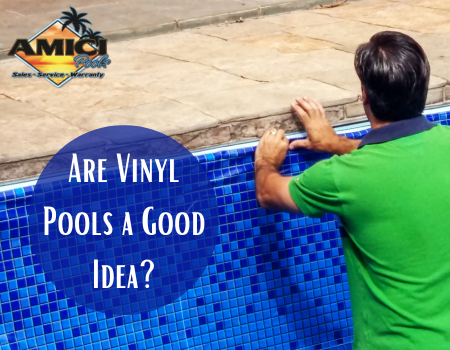When planning to install a pool, choosing the right material is a critical decision. Vinyl pools, known for their affordability and customization options, are popular among homeowners. However, they come with their own advantages and considerations.
What is a Vinyl Pool?
A vinyl pool is constructed with a flexible vinyl liner fitted into a metal or polymer frame. The liner is coated with UV and chemical-resistant materials, which helps prolong its lifespan. Vinyl pools can be designed in various shapes and sizes, offering greater flexibility and customization than some other pool types.
Advantages of Vinyl Pools
 Cost-Effectiveness
Cost-Effectiveness
Vinyl pools are generally more affordable than concrete and fiberglass pools. Their initial installation cost is lower, making them a budget-friendly option for homeowners. Additionally, because they have a smooth surface, vinyl pools require fewer chemicals to maintain water balance, which can save money on maintenance over time.
- Quick Installation
These pools are faster to install than concrete pools. Depending on factors like weather and ground conditions, they can be ready within 1-3 weeks. For those eager to start using their pool, this shorter installation timeline is a significant benefit.
- Customizable Design
Vinyl pools offer a high degree of customization in terms of shape, size, and depth. Unlike fiberglass pools, which come in pre-molded shapes, vinyl pools are built to match the homeowner’s desired specifications. This flexibility makes them an attractive choice for unique or irregularly shaped spaces.
- Smooth Surface
The vinyl liner is non-porous and smooth, which makes it gentle on the skin and reduces the chances of scratches or scrapes. Unlike concrete, which can feel rough underfoot, vinyl pools offer a more comfortable swimming experience.
- Low Initial Maintenance
Vinyl’s smooth, non-porous surface makes it less prone to algae growth compared to concrete. This can reduce cleaning time and effort, especially when combined with regular pool maintenance practices.
Potential Drawbacks of Vinyl Pools
- Lifespan and Durability
While vinyl pools are durable, the liner typically needs replacing every 7-12 years, depending on pool usage and upkeep. The liner can be punctured by sharp objects or heavy pets, which may lead to leaks if not promptly addressed. For homeowners looking for a long-term solution, the periodic replacement of the liner may be a consideration.
- Vulnerability to Damage
Sharp objects, rough play, or certain pool equipment can damage a vinyl liner. Vinyl pools are not recommended for homes with large pets that might claw or scratch at the liner. Minor tears can sometimes be repaired, but significant damage might require full liner replacement.
- Less Resale Value
Compared to concrete or fiberglass pools, vinyl pools may add less value to a property. Some buyers may perceive them as higher maintenance due to the liner replacement requirements, which could be a factor if you’re considering resale value.
- Limited Compatibility with Features
Adding built-in features like benches, steps, or complex water features can be more challenging and costly with vinyl pools. While vinyl pools can incorporate these features, they are often pre-fabricated or require special attention during construction, which can add to the cost and installation time.
- Temperature Sensitivity
Vinyl liners can become brittle over time, particularly in extreme temperatures. Cold weather can cause the liner to lose flexibility, increasing the risk of cracking. Homeowners in colder climates may need to take additional steps to protect the liner during winter.
Maintenance Considerations for Vinyl Pools
Vinyl pools generally have low daily maintenance requirements, but routine care will prolong the liner’s life:
– Use a Pool Cover: Covering the pool when not in use helps reduce debris accumulation and minimizes UV exposure, which can degrade the liner over time.
– Balance Chemicals Carefully: Proper water balance prevents liner damage. Vinyl liners can fade or weaken if exposed to unbalanced pH or high chlorine levels.
– Clean Gently: Avoid using abrasive tools or brushes that might puncture or wear down the liner. Instead, use gentle tools and soft brushes specifically designed for vinyl liners.
– Inspect Regularly for Wear: Checking for any tears, scratches, or discoloration early can help prevent more extensive (and expensive) repairs.
When to Contact a Professional
While many aspects of pool care can be managed independently, certain situations may call for professional help:
– Liner Replacement: Replacing a vinyl liner is a specialized task that requires professional skills to ensure proper fit and sealing.
– Tear Repair: If you notice a tear or puncture, it’s best to consult a professional to assess and repair the damage before it worsens.
– Seasonal Maintenance: If you live in an area with freezing temperatures, professionals can winterize your vinyl pool to protect the liner from potential cold-weather damage.
Is a Vinyl Pool Right for You?
A vinyl pool is an excellent choice if you’re looking for an affordable, customizable option and can manage periodic liner replacements. They’re ideal for families who prioritize initial savings and flexibility in pool shape and size. However, if long-term durability and resale value are primary considerations, you may want to compare the pros and cons of other pool types, like fiberglass or concrete.
Vinyl pools offer many benefits, from their budget-friendly installation to their versatility in design. With proper care and maintenance, they can provide years of enjoyment and relaxation. If you’re unsure about the maintenance requirements or have specific needs for your pool setup, consulting with a pool professional like Lake Havasu City Pool Service can help you make the best decision for your space and lifestyle, as well as provide different pool services.
